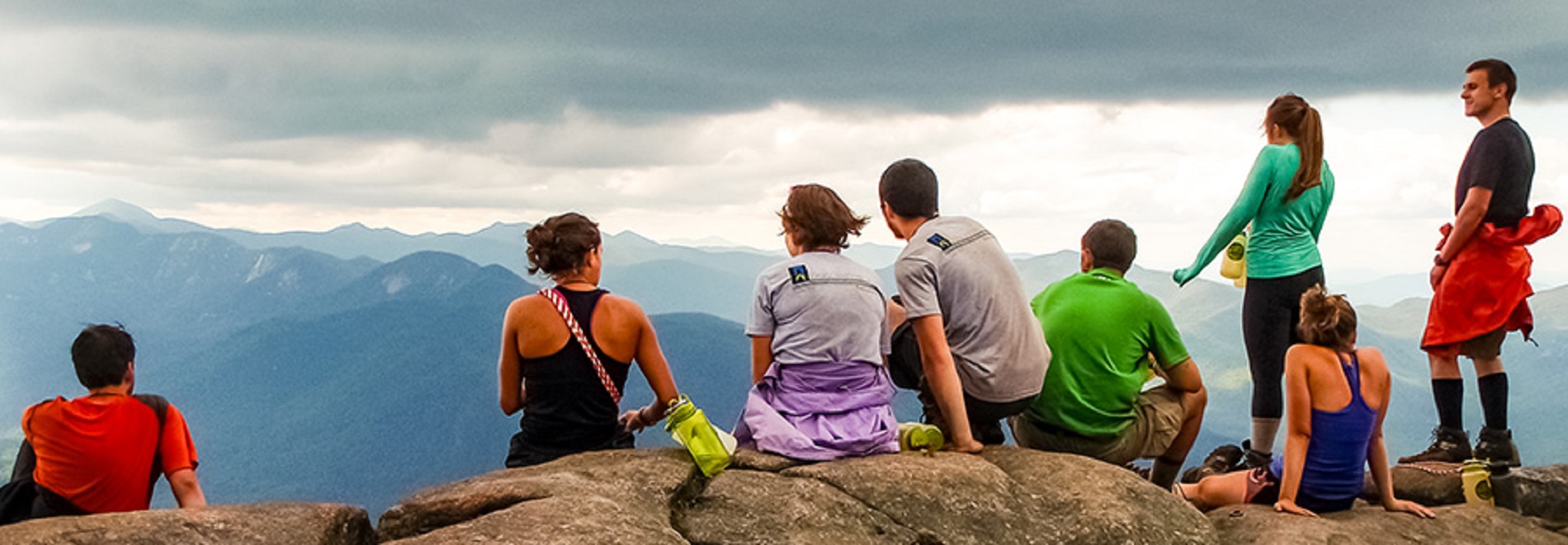An outdoor orientation tradition at Kalamazoo College is marking 50 years of giving incoming students the opportunity to gain self-confidence, build friendships, and develop collaboration and problem-solving skills before they even start class.
Founded in 1973, LandSea was born when then-Kalamazoo College President George Rainsford introduced his idea to create a pre-orientation program for first-year students focused on an Outward Bound-style, wilderness-education experience.
That summer, 10 faculty and staff members, including President Rainsford, participated in Outward Bound wilderness programs to explore the possibilities of wilderness experiences and their future inclusion in the curriculum. Rainsford was a trustee for the Colorado Outward Bound School and a member of the Great Lakes College Association (GLCA) Steering Committee for Wilderness Programs. Funding for the development of the wilderness program was provided by grants from the DeWitt Wallace Foundation and the Lily Foundation.
The initiative proved promising, and before the start of fall quarter, 16 first-year students registered for the first wilderness experience with Coordinator of Campus Activities Robert Doud serving as an administrator and leader. The students spent six days backpacking in the Porcupine Mountains in northern Michigan.
In 1974, 60 first-year students registered for Michigan by Land and Sea with two-week rotations on land at Pictured Rocks National Lakeshore and one week at sea with the 38-ton brigantine vessel Playfair. Hiking and canoeing were added at Killarney Provincial Park in Ontario, Canada, a year later.
Those foundational experiences were the start of a cherished tradition at K as the program continued growing, allowing subsequent classes of first-year students to explore new landscapes, network, and set up their support systems.
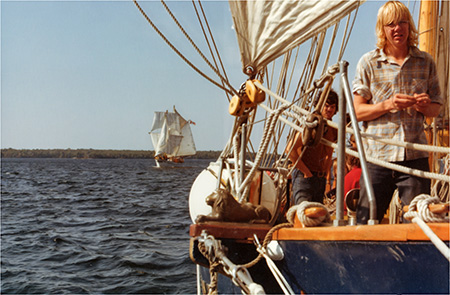
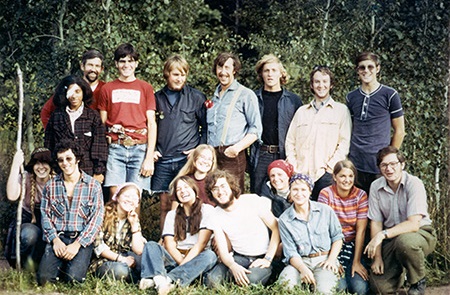
– Kim Chapman ’77
LandSea co-founder, wilderness enthusiast and Outward Bound school attendee David Winch—at the time an associate professor of physics at K—took LandSea’s helm from 1976–1991.
In a 1980 LandSea brochure, Winch said, “Students go into LandSea anticipating the exciting individual experiences—the hiking, climbing and sailing. But most students come out with a sense that the biggest benefit is the people. There is an intensity to this experience that helps to develop bonds between us all.”
Thomas Breznau took LandSea’s reins in 1992 as he set goals of increasing enrollment, securing self-funding, adopting detailed risk-management plans, creating in-depth training for student leaders, and establishing ongoing supportive relationships with staff. In 1995, the program evolved its emphasis further to include rigorous leader training, adding more coordinators and certifying all student leaders as wilderness-first responders.
In 2011, Jory Horner succeeded Breznau as the director of LandSea and Outdoor Programs, a position he still relishes today.
“Not that many programs can celebrate a 50th anniversary, so it’s exciting,” Horner said. “I think we were one of the first 10 outdoor orientation trips in the country, and it’s encouraging to look back and see how long it’s been around and how many different people have been involved with it.”
LandSea has received local appreciation and national applause as a standard-bearer for pre-orientation programs in higher education. The Outdoor Orientation Benchmarking Survey (TOOBS), a national report released last April, ranked K’s program first, second or third among similar programs in eight of the 16 categories that measure various areas of student development and a student’s identity related to the institution.
In general, participants of outdoor orientation trips such as LandSea are more likely to develop social connectedness, feelings of belonging, campus involvement and independence with increased retention rates and higher grade-point averages. At K specifically, College records show that students who have participated in the trip have maintained higher GPAs than their peers in nine of the last 11 academic years, and first-year students from 2012–19 were consistently more likely to graduate.
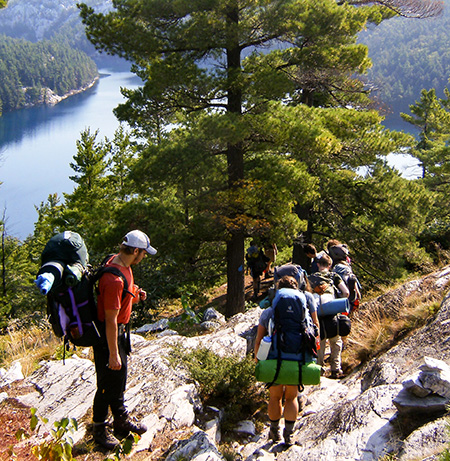
“It is day 15 of my first wilderness expedition. In the last two weeks I have been further north than ever before. I’ve seen more stars in one night than I have in my entire life. I have journeyed through pine forests more beautiful than any cathedral back home. I think about the misery I felt on day one as we left base camp. The misery I documented on water-stained pages of my journal, the rain and the wetness on the inside of my second-hand jacket. I never would have guessed it, but I want to linger here in the woods for just a bit longer. Tomorrow we will be getting on a bus bound for the college I now belong to. I may never see this place again.”
-Paul Lovaas ’13
The COVID-19 pandemic forced Outdoor Programs to pause LandSea for a year in 2020 and stay closer to home—in Traverse City, Michigan—in 2021. However, 2022 marked a return to form, as well as introduced new options for incoming students. Participants can currently select between one of two programs in the mountains of Adirondack State Park in upstate New York—where LandSea generally has been since 2012—and one at Pretty Lake Camp near Kalamazoo.
Adirondack State Park features the largest system of hiking trails in the country, along with 3,000 lakes and ponds, 1,200 miles of rivers and its state’s highest mountains. There, LandSea Basecamp-option participants explore Massawepie Lake by hiking, canoeing, climbing, implementing service projects and rafting on the Hudson River during an 18-day program. Expedition-option participants primarily go backpacking and canoeing, also over 18 days. Each small group of participants travels and sets up new campsites each night with a climb-and-rappel day, a service-and-reflection component and finishing with a day of rafting on the Hudson River.
The shorter, less rustic program at Pretty Lake features day hikes, bike trail explorations, paddling on the water, team-building activities and a high-ropes course.
Participants cook their own meals and take on a service project. Small-group activities gather six to eight incoming first-year students and two or three continuing-student leaders over six days in a program warmly welcomed since its inception.
“There’s been a lot of great feedback with some students saying, ’I did the Kalamazoo program, but I would not have done the Adirondack programs,’” Assistant Director of Outdoor Programs Jessica Port said. “It highlighted the need we had for a third program. We heard, ‘This was a great experience and exactly what I needed to build some friendships and find some mentors in older students. It helped me try something new and out of my comfort zone, and it was safe and an achievable step before coming to college.’”
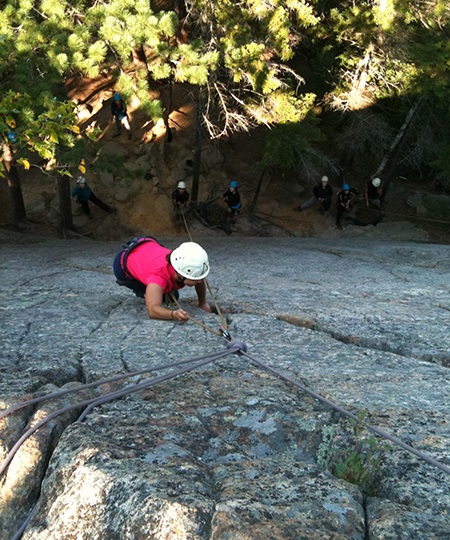
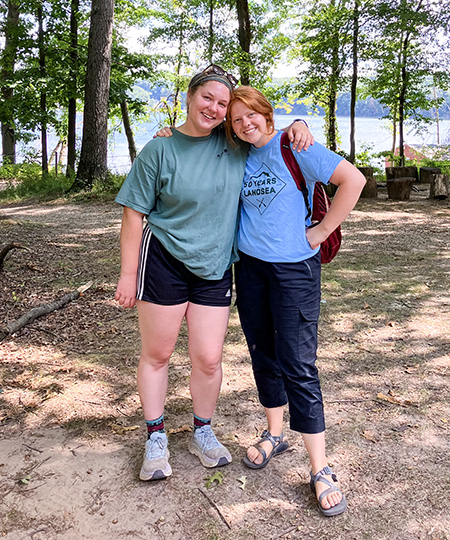
“After accomplishing what seemed to be impossible, climbing and rappelling sent our spirits soaring. Strapping ourselves into rope harnesses we scaled the smooth rocks and discovered strength and courage that many of us didn’t know we had. Nothing seems impossible after a steep climb and 140 foot rappel.”
-MM Frederick ’00 and Annie Robertson ’00
Student leaders are the backbone of the LandSea program, as they facilitate the participants’ experience, offer support, teach skills and serve as role models. They encourage the incoming first-year students to challenge themselves, reflect on passing from high school to college, open themselves to others, build effective relationships and take responsibility for themselves.
“I’m proud of the staff, but also of the fact that so many students have poured time and energy into the program and gotten so much impact out of it as well in their own lives,” Port said. “I don’t know if excitement is the right word, but I feel joy when I think of all the leaders and those participants who have gotten so much out of the program, and what they’ve poured into it, too.”
“I think it’s humbling to know that until the past two years, the trip leader position has always been a volunteer position,” Horner added. “It has required at least 30 days of somebody’s summer. To ask that much of people and to have so many people willing to do that every year, for 50 years, is incredible. I think there are programs out there that have struggled to find trip leaders, and yet this program has had many people lead as a way to give back after the experience they had as incoming students.”
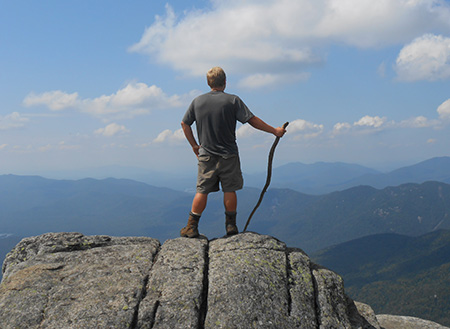
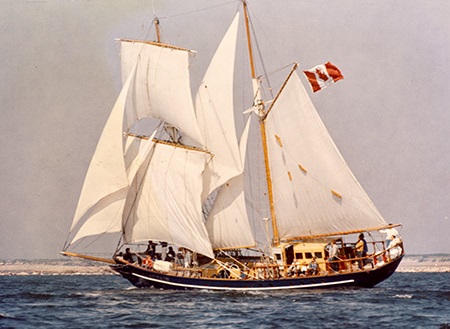
“LandSea 1982 was a blessing for me. As a foreign student arriving in the U.S. from Argentina for the first time, the three weeks spent on Lake Huron and in Canada helped me land on my feet quickly…I remember the difficulty of building a fire in the rain, freezing at night, solo rappelling, the northern lights when the sky was clear, beavers, Rye-Vita crackers to fight seasickness on the way back to Windsor, and many, many other wonderful memories. While I was blessed to go back as a leader a couple of years later and have many fond memories of that trip, my first foray into Canada and Michigan with LandSea is something I am thankful for and will never forget.”
-Marcelo Casas ’86
Regardless of which program students choose, they have no access to electronic devices such as cellphones during the trip, further enabling opportunities to create relationships that last long beyond LandSea.
“It’s so rare nowadays that someone might get a chance to be away from their phone for a week to two and a half weeks, letting you kind of see what bubbles up in your psyche when electronics aren’t a barrier between you and the people with you,” Horner said. “The relationships that current students and trip leaders develop allow students to get to know somebody over a longer term and tap into each other when they need their friends. The first-year students get a better chance to ask, ‘What is K really like?’ They get connected, establish their social networks, and talk about activities at K, whether they’re into the outdoors or not.”
Greta Farley ’22, who now works as a coordinator for Outdoor Programs and LandSea, provides testimony about LandSea as a first-year student.
“LandSea wasn’t the reason I applied to or came to K, but it was a definitely a factor in deciding where I saw myself and how I wanted to introduce myself to a new part of my life,” Farley said. “I had never been backpacking before. I had never done any serious camping before. But I signed on for one of the Expedition routes and I had a great time. I met some of my best friends in my patrol, one of whom I ended up living with for three years in college. There was an automatic trust and camaraderie among people in my group and it socially made the transition to K more comfortable. Physically, it was challenging, and we were tired by the end of the day, but it was a really cool way to enter college, having two and a half weeks where I was proud of myself at the end of every night.”
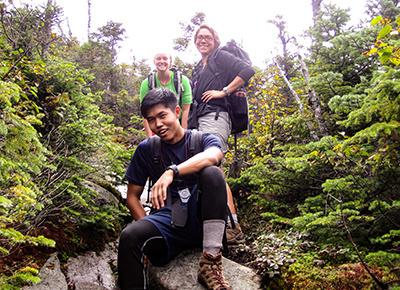
“A LandSea-er is one of those people who arrived on campus for the first day of ’82 looking like they had been through a war. The typical LandSea-er arrived wearing a flannel shirt, jeans, wool socks and hiking boots (despite the 90-degree weather), and carrying a bag of dirty clothes. After two weeks of hiking, canoeing, and sailing in Canada’s Killarney Provincial Park, they looked, as well as smelled, bad enough to make any roommate scream in terror. Many freshmen, upon first seeing their dirty new roommates, asked if the LandSea-er had also put ‘Always neat and organized’ on the dorm living questionnaire.”
– Lisa Gigante ’82 (The Index 1982)
Maggie Zorn ’24 coordinated the development of a 50th-anniversary commemorative book for LandSea as their Senior Integrated Project (SIP). Yet Zorn says they never had a chance to participate as a first-year student due to the pandemic, and they probably wouldn’t have participated anyway based on past limited experiences in the outdoors. Regardless, they recognized what LandSea did for their peers.
“I didn’t come from a family that did a lot of camping, and we never went backpacking,” Zorn said. “We would do day-hike trips, but nothing to the extent of LandSea. Then, we got to campus, and I started meeting some of the people who did go on LandSea. One of my best friends and I then talked about applying to be leaders for the 2021 program. I went through the application process and decided I could get a lot more interested in outdoor activities and maybe outdoor education in general. I led Traverse City on different patrols for the abbreviated program there, and it was an incredibly life-changing experience. It made me rethink a lot of the way that I am with my identity and my relationships.”
As someone who might have passed on the LandSea experience as an incoming first-year yet found the program transformative later in their college career, Zorn is uniquely positioned to explain why they think 17- and 18-year-old high school students committed to coming to K should attend LandSea as first-year students.
“LandSea is not a program designed to make you love backpacking or being outside,” they said. “It’s a program designed to help introduce you to other people, and it allows you to build some of your first connections for college. Even if you have hesitations, it’s designed to be a program that allows somebody who’s never done anything of this type to participate, learn things and struggle, but feel good about themselves at the end of the day while making connections with others who they might never otherwise have gotten a chance to meet.”
Yet none of those moments would be possible without support for LandSea from the entire K community.
“I hear from colleagues at other institutions where their orientation trip is not as well-known,” Horner said. “It may be well-regarded by other outdoor orientation programs, but not well-regarded by their own institution. The amount of support that we get from faculty and staff, including the Admission Office, is pretty incredible. The amount that it gets plugged, talked about and elevated, both informally and formally, is appreciated. I don’t take that for granted.”
That K community also includes alumni.
“K would love for LandSea to be possible for every interested student, regardless of their ability to pay, and alumni want students to have the possibility of a life-changing experience the same way that they did,” Associate Vice President for Development Andy Miller ’99 said. “We want students to have that support system and the transferable skills, so we can introduce people to something that they never knew they could love. LandSea has set K apart for the past 50 years, and alumni want to give this experience to students who wouldn’t be able to afford it otherwise.”
Miller himself benefited from LandSea as a first-year student and for three years as a leader. It’s where he met his wife and two people who are among his best friends to this day.
“I had never done much in the way of outdoors activities, backpacking, camping, etc., and this was an 18-day experience in the Canadian wilderness,” Miller said. “We were out there carrying everything we needed on our backs, working as a little team of five incoming students and one upper-class student leader. It was an incredible introduction to the College, but the microcosm was with these six K students together. Then we also interfaced with a couple of other groups with similar sized patrols. We sailed on a 75-foot brigantine in the Georgian Bay of Lake Huron. There was a professional crew, but we sailed the ship. We were the ones pulling the lines. It opened a sense of what was possible. It widened my idea of what I could do. Then, of course, the camaraderie that comes when you’ve been hiking all day for miles in the rain is special, and LandSea is unique among college-orientation programs in how long it is and the variety of activities. You find out what you’re made of, and you realize at the end that you’ve got this incredible support system. That happens every year and it builds on a feeling of what’s possible.”
Plus, students will continue benefiting from those feelings for years to come.
“I love the moments when you see LandSea click for a leader or participant,” Port said. “They might be struck by wonder and awe with a view from a mountain we hike, or a concept might click for a leader, and they realize they can use their strengths to lead in a different way. Those moments catch me by surprise and they’re always refreshing to see.”
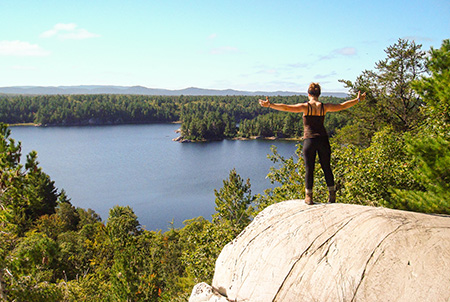
“Tonight they gave me a hat and I felt my arms fill up with a kind of family. Tonight we ate beautiful food in a beautiful place together and danced in a parking lot, just for the sake of feeling our molecules jump around with how alive we all are. I felt myself slip and stretch out of my body quietly, spreading out over everyone and the water and the sky and toward the horizon and I was covering it all, some endless center of mine I didn’t even know existed, or at the very least didn’t remember. I think that pool in me might go on forever and could reach out into everything for the rest of time, so long as I have people, places, and times like this to pull it out.”
– Rachel Dallman ’11
Photos and quotes accompanying this story were excerpted from 50 Years of Land and Sea, a book commemorating LandSea’s anniversary. The book was in development at the time this story was written and will be available later this year.


